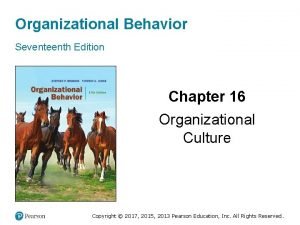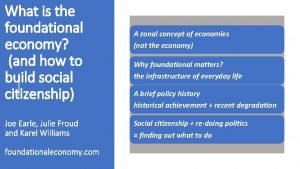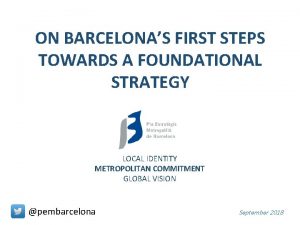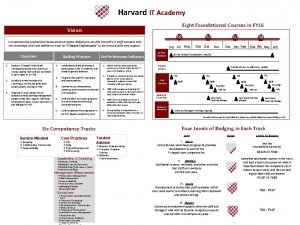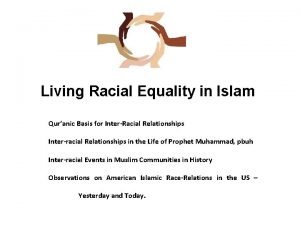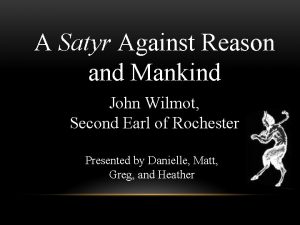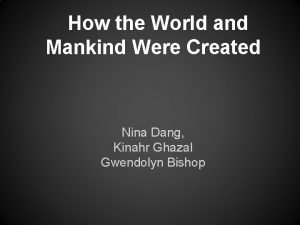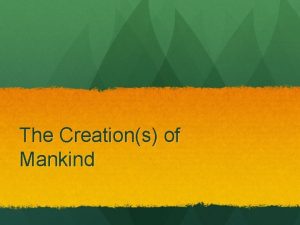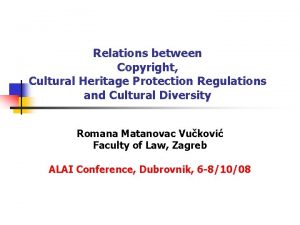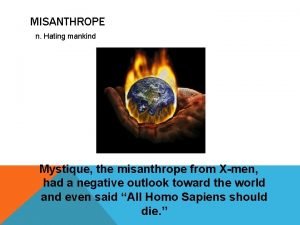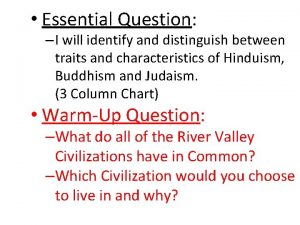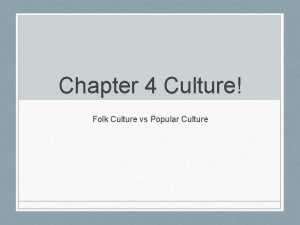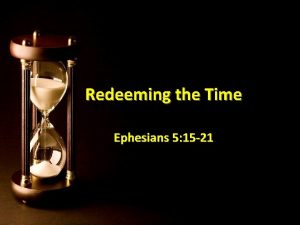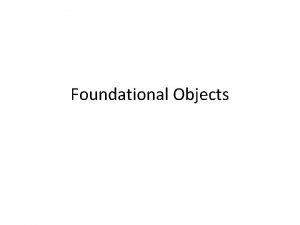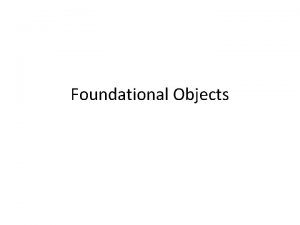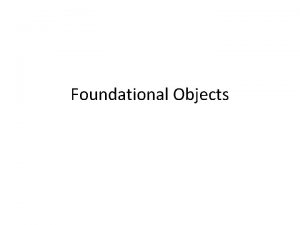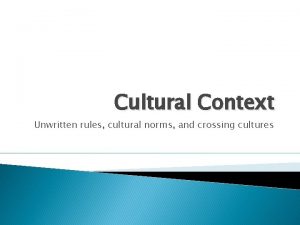Crossing Cultures Redeeming Mankind Session 1 Foundational Cultural
































- Slides: 32

Crossing Cultures – Redeeming Mankind Session 1: Foundational Cultural Considerations Marvin Newell, DMiss


First & Final Authority

Crossing Cultures in Scripture The Bible is a portrayer of cultures: it depicts and describes how communities and societies have lived out their beliefs, values, and customs. The Bible is a sculptor of cultures: it helps shape and influence numerous cultures for the better found throughout the Bible. The Bible is an appraiser of cultures: it’s supracultural values are meant to be the accepted moral standard for all cultures found everywhere through all of time.

Definition of Culture is the distinctive beliefs, values and customs of a particular group of people that determines how they think, feel, and behave. Intertwining these three components comprises a people’s worldview

The Dimensions of Culture Beliefs (think) Experiences World View Experiences Value s (feel) D E C I S I O N S Customs (behave) Adapted from Paul Hiebert

Culture’s Functions Culture functions as both a road map & the road signs

Cultures encountered in Scripture Hebrew, Chaldean, Egyptian, Ethiopian, Hittite, Midian, Mesopotamian, Syrian, Assyrian, Philistine, Canaanite, Moabite, Babylonian, Persian, Greek, Roman

Some of those who had X-C encounters Abraham Sarah Lot Jacob Joseph Moses Rahab Joshua Samson Ruth David Solomon Elijah Ezekiel Daniel Jonah Nehemiah Esther Jesus John Luke Philip Peter Paul Silas Barnabas Timothy John Mark

Eden: The Beginning of Human Culture Genesis 1

The Beginning of Human Culture: Secular - Humanism Darwinian Delusion

Christian anthropologist: William Smalley: nothing mentioned Paul Hiebert: no attempt to determine origin of human culture Charles Kraft: “Neither anthropology nor theology can speak conclusively about when culture began. ” Christianity in Culture, page 103

Biblical Perspective: Created in God’s Image

Genesis 1: 26 -27 Then God said, “Let us make man in our image, after our likeness. And let them have dominion over the fish of the sea and over the birds of the heavens and over the livestock and over all the earth and over every creeping that creeps on the earth. ” So God created man in his image, in the image of God he created him; male and female he created him.

The Beginning of Human Culture Genesis 1: 26 -27 The Plurality of God & “Capacity” From Capacity to Actuality Culture at its Best The Deterioration of Culture The Redeeming of Culture

Implications of God as the Bestower of culture upon humans Human culture is not intrinsically evil. God endowed humans with culture so that they might enjoy relationship. Although cultures have become corrupt, culture in and of itself is necessary for human interaction. All humans as descendants of a common father makes possible three tiers of culture: “I am like nobody else” (individual culture) “I am like somebodies else” (community culture) “I am like everybody else” (universal culture)

Implications continued… There is no rational basis for devaluing peoples of other cultures. They are fully human just like you. There is no evaluative basis for considering other cultures as inferior and sub-human. There is no moral basis for abusing others of different cultures, exhibiting a posture of superiority and ethnocentrism. We are all created equal and equally endowed with culture. There is no legal basis for the justification of genocide, the wholesale slaughter of culturally different fellow humans, based on a position of strength and opportunity.

The Tower of Babel: The Beginning of Cultural Diversity Genesis 11 6 And the LORD said, “Behold, they are one people, and they have all one language, and this is only the beginning of what they will do. And nothing that they propose to do will now be impossible for them. 7 Come, let us go down and there confuse their language, so that they may not understand one another's speech. ” 8 So the LORD dispersed them from there over the face of all the earth, and they left off building the city. 9 Therefore its name was called Babel, because there the LORD confused the language of all the earth. And from there the LORD dispersed them over the face of all the earth.

The Tower of Babel: The Beginning of Cultural Diversity Genesis 11 Oneness and Unity Abuse of Unity Gracious Judgment Culture follows language Appreciation of cultural diversity Human Dispersion


In light of this chapter, discuss the following statement from the Cape Town Commitment “Ethnic diversity is the gift of God in creation and will be preserved in the new creation, when it will be liberated from our fallen divisions and rivalry. Our love for all peoples reflects God’s promise to bless all nations on earth and God’s mission to create for himself a people drawn from every tribe, language, nation and people. We must love all that God has chosen to bless, which includes all cultures. Historically, Christian mission, though flawed by destructive failures, has been instrumental in protecting and preserving indigenous cultures and their languages. Godly love, however, also includes critical discernment, for all cultures show not only positive evidence of the image of God in human lives, but also the negative fingerprints of Satan and sin. ”

Abraham: Father of Blessing for All Cultures Genesis 12: 1 -3 1 Now the LORD said to Abram, “Go from your country and your kindred and your father’s house to the land that I will show you. 2 And I will make of you a great nation, and I will bless you and make your name great, so that you will be a blessing. 3 I will bless those who bless you, and him who dishonors you I will curse, and in you all the families of the earth shall be blessed. ”

Abraham: Father of Blessing for All Cultures Genesis 12: 1 -3 God’s global rescue plan Importance seen by the repetition of the promise To Abraham (3 X) To Isaac To Jacob

The Blessing Passages To Abraham: “I will bless those who bless you, and him who dishonors you I will curse, and in you all the families of the earth shall be blessed. ” (Genesis 12: 3) “The Lord said, ‘Shall I hide from Abraham what I am about to do, seeing that Abraham shall surely become a great and mighty nation, and all the nations of the earth shall be blessed in him? ” (Genesis 18: 17 -18) “and in your offspring shall the nations of the earth be blessed, because you have obeyed my voice. (Genesis 22: 18) To Isaac: “I will multiply your offspring as the stars of heaven and will give to your offspring all these lands. And in your offspring all the nations of the earth shall be blessed, because Abraham obeyed my voice and kept my charge, my commandments, my statutes, and my laws. ” (Genesis 26: 4) To Jacob: “Your offspring shall be like the dust of the earth, and you shall spread abroad to the west and to the east and to the north and to the south, and in you and your offspring shall the families of the earth be blessed. ” (Genesis 28: 14)

Abraham: Father of Blessing for All Cultures Genesis 12: 1 -3 God’s global rescue plan Importance seen by the repetition of the promise To Abraham (3 X) To Isaac To Jacob Universality shown by the word “families” Universality shown by the phrase “of the earth” The Blessing

Jesus is the “blessing” “so that in Christ Jesus the blessing of Abraham might come to the Gentiles, so that we might receive the promised Spirit through faith. ” (Gal. 3: 14)

Cultural Practices the Gospel Challenges suttee (wife burning) body mutilation animal sacrifice white magic polyandry religious prostitution honor killing female suppression slavery creation abuse genocide infanticide foot binding abortion human sacrifice voodoo black magic evil eye polygamy wife swapping homosexuality child brides female circumcision punishment by amputation facial tattoos (to ward off evil spirits) unbridled consumerism exploitation incest co-habitation forced child labor

Abraham: Father of Blessing for All Cultures Genesis 12: 1 -3 God’s global rescue plan Importance seen by the repetition of the promise To Abraham (3 X) To Isaac To Jacob Universality shown by the word “families” Universality shown by the phrase “of the earth” The Blessing Abraham’s honored role

Missiological Implications of Abraham Being the Father of Blessing for all Cultures: The “hope of all nations” (i. e. Jesus) theme given through Abraham and his descendants, threading itself through the entirety of Scripture and throughout the church age, means that no people group should be excluded from that hope, no matter how hopeless they appear to be. No group of people should be considered unworthy of our efforts to receive the blessing of Abraham, no matter how distant, remote, or impenetrable they are.

Missiological implications cont… The spiritual blessings intended for all mankind that are found in Jesus, are designed to be enjoyed by every cultural group on the face of the earth, no matter how depraved or hideous their conduct. Abraham, as God’s chosen one, is to be honored by all peoples because of that special calling and his subsequent faith response, no matter how anti. Semitic they are.

Redeeming Mankind God’s global intent is to redeem individuals, and by extension, bring blessing to every cultural expression found on earth. Individuals and entire cultures experience biblically adjusted beliefs, values and customs.

Missio Nexus Web Workshop Questions? Session 2 next week: Crossing Cultures in the Old Testament MNewell@missionexus. org
 Organizational cultures often reflect ________.
Organizational cultures often reflect ________. Sans recourse endorsement
Sans recourse endorsement Gods redeeming love
Gods redeeming love God's redeeming love
God's redeeming love Foundational economy
Foundational economy Foundational public health services
Foundational public health services Foundational community supports
Foundational community supports Foundational strategy
Foundational strategy Foundational marketing
Foundational marketing Foundational framework meaning
Foundational framework meaning It academy harvard
It academy harvard Foundational skills assessment
Foundational skills assessment Foundational marketing
Foundational marketing Foundational skills definition
Foundational skills definition Foundational marketing
Foundational marketing Mankind was naught by a single nation
Mankind was naught by a single nation A satire against reason and mankind
A satire against reason and mankind Mankind should love nature
Mankind should love nature How the world and mankind were created
How the world and mankind were created The creations of mankind
The creations of mankind Mankind disp
Mankind disp Flowers together
Flowers together Mankind serving life
Mankind serving life Destruction of mankind
Destruction of mankind Humor's
Humor's A satire against reason and mankind
A satire against reason and mankind Mankind loughborough
Mankind loughborough Destruction of mankind
Destruction of mankind Broth cultures
Broth cultures Is buddhism monotheistic or polytheistic
Is buddhism monotheistic or polytheistic Which cultures believe in reincarnation
Which cultures believe in reincarnation Tandem language
Tandem language How does popular culture diffuse
How does popular culture diffuse
